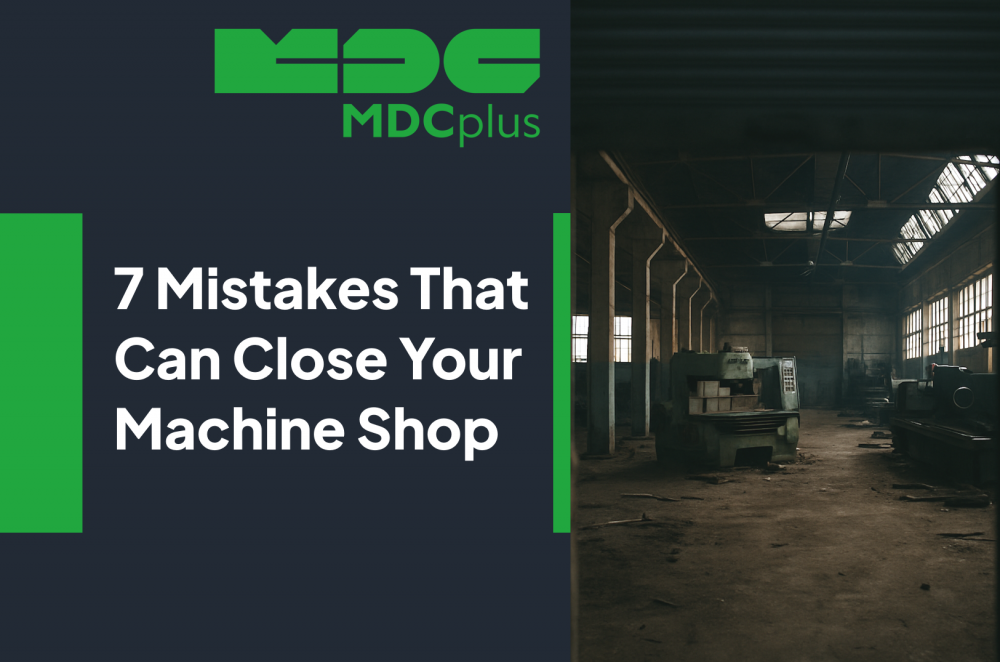7 Costly Mistakes That Can Close Your Machine Shop
1. Neglecting Data-Driven Decisions
Gut instinct isn’t a strategy.
In today’s connected factories, relying on manual logs, scattered spreadsheets, or just “what we’ve always done” leaves blind spots. Without real-time insights into utilization, downtime, quality, and throughput, you’re flying blind.
Shops that fail to invest in basic data collection and analytics tools often misjudge their costs, underprice jobs, or run inefficiently for years—until it’s too late.
2. Chasing Every Job (Instead of the Right Ones)
Not all business is good business.
A common mistake is saying yes to every RFQ to keep spindles turning. But low-margin work, poor-fit parts, and inconsistent clients drain resources and create scheduling chaos.
Smart shops build a niche—whether it’s materials, tolerances, or industries—and focus on profitable, repeatable work.
3. Underestimating Maintenance
If you wait until it breaks, you’ve already paid too much.
When preventive maintenance becomes an afterthought, small mechanical issues evolve into catastrophic downtime. That downtime not only halts production, it ruins on-time delivery metrics and trust.
Ignored machines become unreliable assets. Reliable assets become liabilities. And customers notice.
4. Failing to Train and Retain Talent
Your machines are only as good as the people running them.
Skilled machinists, programmers, and operators are the backbone of any shop. Yet many owners focus on buying new equipment while underinvesting in the team.
Without cross-training, growth paths, and a healthy shop culture, you’ll lose talent to competitors—and with it, knowledge that can’t be easily replaced.
5. Poor Quoting and Cost Tracking
You can’t make money if you don’t know where it’s going.
Shops that don’t track true job costs (machine time, labor, setup, scrap, etc.) often underquote work. Even when they’re busy, they’re bleeding margin. And they rarely know why.
ERP systems or at least job costing software should be seen as a necessity, not a luxury.
6. Delaying Investment in Modern Tools
You don’t need to digitize everything—but you can’t digitize nothing.
Refusing to adopt even basic shopfloor data tools, paperless job routers, or digital work instructions leaves you behind. Competitors with better visibility and leaner setups will out-bid, out-deliver, and outlast you.
You don’t need Industry 4.0 overnight. But a paper-only process in 2025 is an obituary in slow motion.
7. Lack of Long-Term Planning
The shop can’t run forever on urgency alone.
Many small and mid-size machine shops are owner-driven. But without succession plans, growth roadmaps, or reinvestment strategies, the business stagnates—or dies when the owner retires.
Vision matters. Whether it's new markets, partnerships, or processes, the shops that survive treat strategy like a tool, not a luxury.
Closure rarely comes with a bang. It arrives after months or years of drifting off course. The good news? Most of these pitfalls are avoidable. All it takes is a willingness to look at your data, your team, and your decisions with brutal honesty and act before the market does it for you.
About MDCplus
Our key features are real-time machine monitoring for swift issue resolution, power consumption tracking to promote sustainability, computerized maintenance management to reduce downtime, and vibration diagnostics for predictive maintenance. MDCplus's solutions are tailored for diverse industries, including aerospace, automotive, precision machining, and heavy industry. By delivering actionable insights and fostering seamless integration, we empower manufacturers to boost Overall Equipment Effectiveness (OEE), reduce operational costs, and achieve sustainable growth along with future planning.
Ready to increase your OEE, get clearer vision of your shop floor, and predict sustainably?
Other articles
While both involve structured review and analysis, their objectives, scope, and outcomes differ significantly. This article exploring this topic further.
